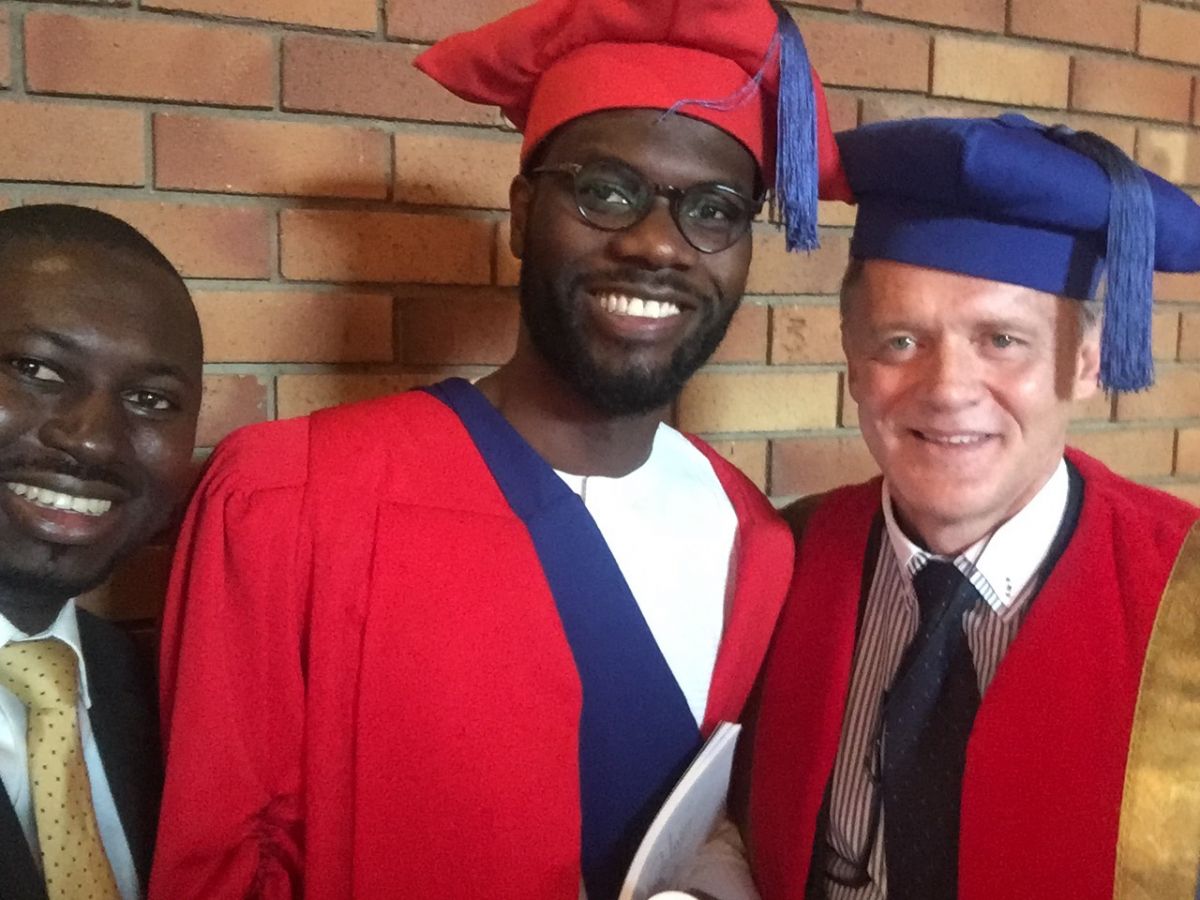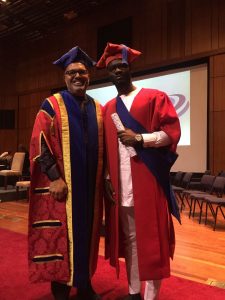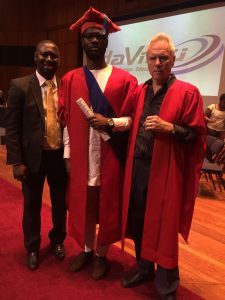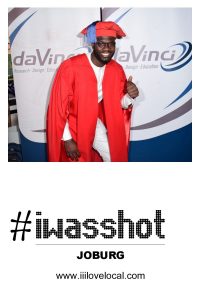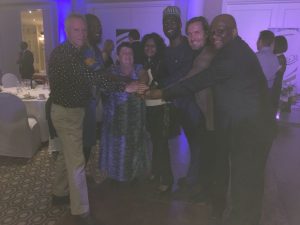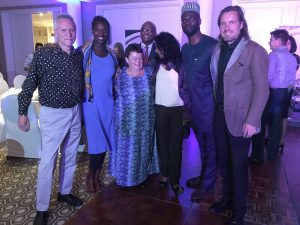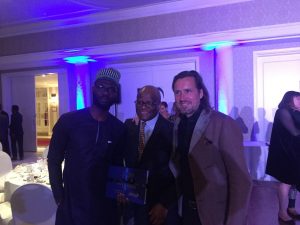PhD! Jubril Adeojo graduates on Integral Banking, enabling Financial Inclusion for Marginalized Communities in Nigeria and Africa
13 September 2017: Trans4m Fellow Jubril Adeojo from Nigeria graduates in the Trans4m Da Vinci PhD Program on Integral Development with a groundbreaking approach to Integral Banking – in close cooperation with an inter-institutional innovation ecosystem comprising of Heritage Bank, the local Ajegunle community of Lagos and CISER Nigeria.
In particular through CISER Nigeria, and together with his CISER colleagues, Jubril Adeojo is determined to take the Integral Banking approach further to foster the holistic development of Nigeria and Africa. Jubril is already framing his post doctoral work, to create an additional lever for Integral Banking in Africa.
More on her Jubril and his approach to Integral Banking for the Common Good here.
Below find photos of the graduation events as well as a summary of his thesis
People often asked me why I embarked on this PhD journey; I responded that I get worried when I hear the voices of suffering people in Nigeria and the enlarged Africa. From the ordinary disgruntled young Nigerian without a paid employment of any sort; to a single mother who has shutdown her small business, because she cannot afford to import goods anymore due to scarcity of foreign currencies and exorbitant exchange rates; and a married man who just lost his job because his employer could not just afford to fuel the generator set anymore. These are the societal imbalances that have led me to this research work alongside other co-researchers to find and co-create new ways to not only lessen them, but also to eventually eradicate them.
As I commenced this research-to-innovation journey within the context of my organization (the Nigerian banking system), I also uncovered the dysfunctionality and disservice of the widespread banking practices to the Nigeria rural indigenous (informal) communities, which further impedes the rate of sustainable development for the common good.
These imbalances then gave birth to my research objectives focused on co-creating a scalable integral banking methodology that will enable access to sustainable development for the common good of the underprivileged people and relegated communities in Nigeria and enlarged Africa. As an end goal of the integral banking, this research focused on providing different and profuse forms of livelihood in the light of communipreneurship, within both the formal urban communities and marginalized informal rural communities for the common good of Nigeria.
In applying the Integral Worlds Research philosophy, I followed the eastern path of renewal, building on the narrative method, hermeneutics methodology, critical theory research method, and co-operative inquiry as action research. This has enabled me on this journey to not only reconnect with my inner core and source, but also understand that sustainable innovations cannot be achieved or sustained without the cognizance of the collective calling of organizations, communities and societies grounded in our indigenous cultural values and rituals. I believe that African countries as societies in transition need to re-invent themselves to transform themselves by re-connecting with our indigenous source and acknowledging the exogenous world-view knowledge, rather than ‘be developed’ by others.
To achieve the collective goal of this research-to-innovation PhD journey, I also applied the 4C’s and CARE trajectory models. The two models enabled me to understand myself inside out, leading to the being of this PhD journey, and to dimension and understand how the outer context is co-constructed. The core objective of the two models is to facilitate as well as ensure that the co-created new concepts on this PhD journey are tested and imparted within a context i.e. organization and community. In my case, I imparted alongside CI group members the new concepts in Heritage Bank Plc (my workplace) and Ajegunle (my activated community).
The acronym 4C’s and CARE represents: the Calling of self, my organization and society adopting the tenets of the narrative method, leading to Ajegunle community activation in collaboration with the Centre for Values in Leadership (CVL) and Centre for Integral Social and Economic Research (CISER); the Context is built on the hermeneutic interpretation of contextual imbalances (i.e. transdisciplinary, transcultural, transformational and transpersonal imbalances), leading to the Awakening of the Integral Consciousness of my integral ecosystem comprising Centre for Integral Social and Economic Research (CISER), Heritage Bank Plc, Centre for Values in Leadership (CVL), and Ajegunle community. The Co-creation was built on the tenets of the critical theory in order to navigate and uncover multiple connections in different worldviews on the theories of entrepreneurship, anthropology, psychology and banking, leading to an Institutionalized Research-to-Innovate within the Centre for Integral Social and Economic Research (CISER) Nigeria. The final C, Contribution was attained firstly by building on the four stages of knowing of co-operative inquiry to critique the practicality of the new concepts from the co-creation part, towards testing the concepts in my activated community, Ajegunle as an Embodiment of Transformative Education and Enterprise.
Through my research-to-innovation journey within the context of the Centre for Integral Social and Economic Research (CISER) in Nigeria, we co-created and introduced new integral views to banking, finance and entrepreneurship for the common good. The new views are Integral Banking and Isejoseneurship (translated to English as Communipreneurship).
At CISER, we culminated that Integral Banking is the means to achieve Communipreneurship as captured in the topic of this thesis. In testing the desired impact of the two concepts, I formed a co-operative inquiry group (CI group) of twelve (12) people from Heritage Bank, CISER, Ajegunle (my activated community), and CVL. The CI group underwent the four stages of Heron’s knowing, from experiential, to imaginal, propositional and practical, toward an embodiment of transformative education for CISER.
